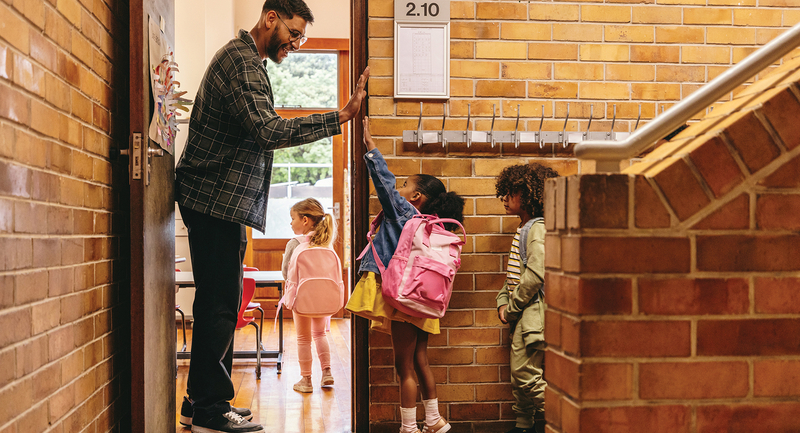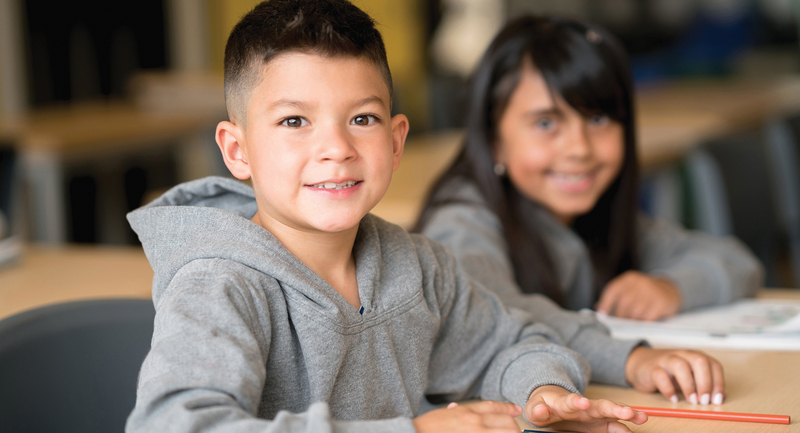When it comes to cultivating racial understanding, sociologist Robin DiAngelo believes that white people have work to do. In her best-selling book White Fragility (Beacon Press, 2018), DiAngelo argues that no white person—no matter how well-meaning—is exempt from the forces of racism. Yet when the topic of racism comes up, they often become defensive and “weaponize” their hurt feelings. This refusal to acknowledge the reality of systemic racism blocks white educators from understanding the experiences of their coworkers, parents, and students of color.
What is white fragility?
The term is meant to capture how little it takes to upset white people racially. For many white people, the mere suggestion that being white has meaning will cause us to respond defensively. One of the consequences of socialization into a society that is deeply separate and unequal by race is that the vast majority of white people live segregated lives. So we're rarely outside of our comfort zones. When we are challenged in ways that cause us discomfort, we tend to lash back.
Yet the impact of our reactions is not fragile at all. In fact, it functions as a kind of everyday white racial bullying. We make it so difficult and punitive for people of color to talk to us about their experiences or to give us feedback about our inevitable, and often unaware, racist patterns and perspectives that most of the time they don't give us that feedback, lest they risk more punishment. So our hurt feelings and our defensiveness become weaponized.
We also lash out at white people who try to break with white solidarity and push other white people to engage with more complexity and sensitivity. I think most white people can relate to the family dinner in which Uncle Bob says that racist thing and everybody cringes, but nobody confronts him because they don't want to ruin the dinner. We need to ask ourselves, "Why would interrupting racism ruin our dinner?" And "Why does not interrupting racism not ruin our dinner?" That is the kind of social contract we need to break with, because our silence is just as racist as our relative's explicit statement.
How does this attitude contribute to persisting inequities in K–12 schools?
Because it protects the racist status quo. Schools are highly effective mechanisms for sorting children into unequal places in society—it's what they were designed to do, and they do it with fabulous efficiency. If schools were equal, we would not care what schools our children go to. But oh, we do care what schools our children go to because they are not equal!
One primary barrier to school equality is white middle- and upper-class parents. They have not demonstrated a pattern of wanting equality in schools because their children are served well by the current system.
How does white fragility keep segregation intact?
White fragility is a major part of maintaining white dominance, and to be more direct, white supremacy. The term white supremacy certainly includes what we would think of as neo-Nazism or outright racism. But it is also a highly descriptive sociological term for the society we live in, in which all institutions—languages, norms, policies—reflect and affirm white people at the expense of others. It's the water we're swimming in and we've all been shaped by it, consciously or not. And so to not be able to challenge any of this, lest white people come unglued and feel attacked and unsafe, perfectly holds it in place. I mean, what social problem can you think of in which the best strategy for solving it is to never speak of it? The idea that race conversations divide us is kind of ironic because we're already divided by race. Talking about that division is not what is causing it. Not talking about it is what protects it.
Meanwhile, white people live the most segregated lives of any racial group. Yet, while we speak of the segregation enforced upon blacks in the Jim Crow South as a terrible tragedy, notice how we talk about white segregation—in glowing terms. A white neighborhood is going to be a good neighborhood; a white school is going to be a good school. White people measure the value of our spaces by the absence of people of color, and black people in particular. It's a vicious cycle: When we don't have authentic, sustained cross-racial relationships, we don't know what other people's realities are. Then we're left with the deepest victim-blaming explanations for inequality. When people of color do try to tell us what their realities are, white fragility ensues: defensiveness, argumentation, minimization, and denial.
Some white people are quick to say they're "color-blind" or "treat everyone the same." Is this possible, particularly for a teacher?
The research in implicit bias is very clear: we don't treat everyone the same. Any person who says this is telling me that they (1) don't understand basic socialization, and (2) are not self-aware. This is especially critical for teachers to understand. Students have different needs; they are part of a collective and also individuals, and this is the tension. How do I see you as the unique child that you are, while also understanding that you and I are both members of social groups that shape our lives' outcomes?
For example, while on the one hand we would want to treat male and female children equally, we also know that due to intense gender socialization, they are receiving collective and deeply problematic messages from society at-large. So we account for that in the books we choose, the role models we give students, by attending to what patterns of behavior we might be inadvertently reinforcing, and so on. It is the same with racial socialization. Because the research is clear here, too: Children know as early as 3–4 years old that it is "better to be white." If you pretend that message is not circulating by pretending you don't notice their racial difference, you can't prepare children to resist racist messages. You will also be unable to address how you have been influenced by racist messaging, and how that informs your teaching.
How does white fragility shape teachers' interactions with—and beliefs about—both their students and parents of color?
Most white teachers grew up in white neighborhoods, had white teachers, and now have exclusively white friendship circles. Because they live their lives in segregation, they tend to rely on problematic representations of people of color. Many of those white teachers begin teaching with a deeply internalized fear of black males, in particular. As early as preschool, kindergarten, and 1st grade, they are responding to those black children as if they're dangerous. You've seen it—expulsion, handcuffs, police being called—they're being criminalized, often because white teachers have deep implicit bias, which they would get from living in segregation and relying on limited and problematic sources for their information.
White teachers must understand that there is a deep history of harm between children of color and the institution of schooling. Our schools have not done right by children of color; they have reproduced profound racial inequality. Our schools are vastly unequal. They are funded and staffed differently. Poor black children get the worst of the worst in those terms. The school-to-prison pipeline is a classic example of this; there's disparity in discipline rates, in who gets sent to special education, who gets expelled, and how we interpret curiosity versus disruption.
Parents of color are delivering their precious children into an institution that has consistently harmed them. White teachers need to understand that parents' distrust is rational and has been earned across history. Rather than demand trust, you need to earn it. You need to show them that you're different, not tell them that you're different. These parents are simply advocating for their children; find ways to work with them rather than refuse to engage with their fear and mistrust.
If teachers are doing this work of unpacking their own biases, how would their interactions with students of color look different?
I think a lot of teachers just assume niceness is all that matters. But niceness is not anti-racism. Niceness is not courageous, it's not strategic, it's not intentional, and it isn't going to get racism on the table—or keep it on the table. There is this belief that if I'm smiling at my coworkers of color, I'm fine. If I'm for social justice—and who isn't for social justice?—I automatically do social justice. But no, it's really challenging, and it takes critical thinking, observation, humility, openness, and ongoing education because we are not trained how to do this. If you're in a progressive teacher education program, you might have one required multicultural course. And that is not enough. So you have to keep it going in the building. You have to have monthly film showings and discussions and study groups and reading groups and panels and affinity groups. You must never consider your learning finished.
What can school leaders do to disrupt the "racial status quo" in their buildings?
My dream would be that concern for racial equity is integrated into every interview question for absolutely any hiring that goes on in any school for any position. Because how it works now is, either there's no question at all or there's one so-called "diversity question." It has no weight and the committee has no training in how to read and assess the answer. Having racial equity rolled into every single question will send a clear message to candidates: If you cannot engage with some nuance and complexity in this topic, you're not qualified to teach at our school.
Do you have any final advice for educators?
The number one question I get is, What do I do? What I would offer back is, How have you managed not to know? Why in 2019 would that be your question when the information's everywhere and people of color have been telling us forever? My question is meant to be a challenge, because I actually think most educators are not particularly interested in knowing—and most are not going to do anything different. That's just my experience after 20 years of working with white people. Most are fairly apathetic about racial injustice.
Why don't you know? is also a sincere question. Because if you take out a piece of paper and start to write, you'll have a map. The first thing would probably be "I wasn't educated." OK, there you go; take the initiative and look it up. Second thing, "I don't have many cross-racial relationships." OK, what would you need to do to change that? Third, "I don't talk about race with people of color in my life; I don't talk about race with white people in my life." OK, another difficult but necessary step. Fourth, "I haven't cared enough." If I wrote that final statement down, I'd have a hard time living with it so that would motivate me. But there's your map. Of course, it's not simple and concise and quick. It's a process.
I don't want to offend teachers, but there appears to me to be a superficial caring. This caring is accompanied by a pretty high defensiveness about getting personal feedback: Like, it's fine on general terms until you actually talk to me about what I'm saying or doing; and then you get the white fragility. Certainly, there are committed teachers who are on this journey, but we need more. We need to overcome the barrier of white fragility.






